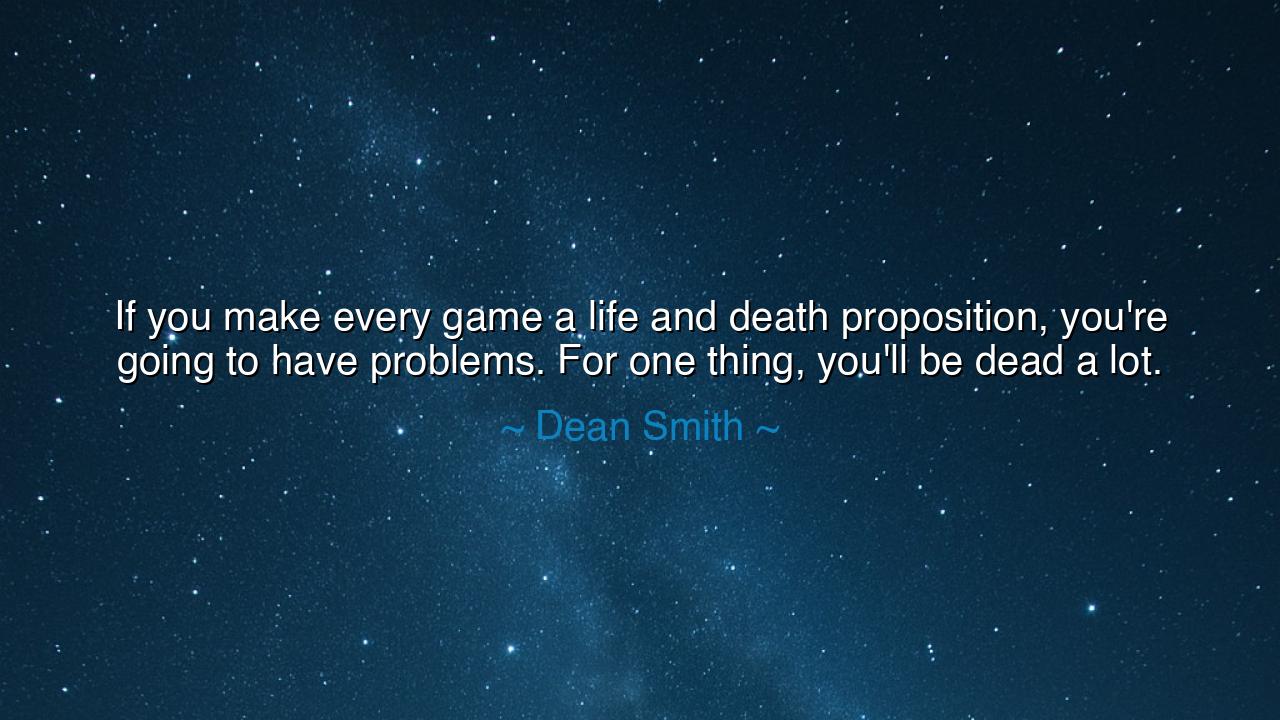
If you make every game a life and death proposition, you're going
If you make every game a life and death proposition, you're going to have problems. For one thing, you'll be dead a lot.






In the wise and steady words of Dean Smith, one of basketball’s most revered teachers, we find a truth that stretches far beyond the boundaries of the court: “If you make every game a life and death proposition, you’re going to have problems. For one thing, you’ll be dead a lot.” Though spoken of sport, these words are not confined to it—they are a lesson in the art of balance, in the discipline of perspective, and in the wisdom of knowing that passion without restraint can consume the very soul it seeks to elevate. Smith, who guided generations of young athletes not only to victory but to manhood, reminds us that to live every challenge as a battle of life and death is to invite destruction, for no human heart can bear that unending strain.
The origin of this quote lies in Smith’s lifelong philosophy of coaching—a philosophy built not on glory but on growth, not on conquest but on character. For him, the court was a classroom, and the game was a metaphor for life itself. He saw too many players, too many people, who allowed the outcome of a single moment to define their worth. Smith taught them that while competition could sharpen the spirit, it must never poison it. He believed that victory should be pursued with all one’s heart, yet held lightly in one’s hands. For the athlete, as for the mortal soul, the greatest danger is not in losing the game—but in losing perspective.
This wisdom, though clothed in the language of sport, echoes the teachings of the ancients. The Stoic philosopher Epictetus taught that serenity comes not from the control of circumstances, but from the control of self. To make every contest, every trial, a matter of life and death is to surrender that serenity—to live in a storm of perpetual crisis. The warrior who draws his sword for every slight exhausts his strength before the true battle begins. Likewise, the person who treats every setback as catastrophe burns through his joy, leaving only ashes of anxiety. Dean Smith, like those ancient sages, understood that wisdom is not found in extremes, but in the steady heart that knows when to fight fiercely and when to let go.
Consider the story of Michael Jordan, one of Smith’s most celebrated students. As a young man under Smith’s tutelage at North Carolina, Jordan was already fierce, driven, and relentless. Yet Smith taught him restraint—taught him that greatness is not achieved through endless struggle alone, but through discipline, teamwork, and grace in both triumph and defeat. When Jordan missed the game-winning shot or faltered under pressure, Smith would not scold or lament. Instead, he reminded him that failure is a teacher, not a tombstone. This lesson became the foundation of Jordan’s legacy. He learned that to endure, one must love the game, not merely survive it.
And so the quote takes on deeper meaning: “If you make every game a life and death proposition, you’ll be dead a lot.” What Smith means is not simply that obsession leads to burnout, but that life, like sport, requires resilience—the ability to bend without breaking, to fail without falling apart. To live every moment in mortal tension is to die in spirit long before death claims the body. Those who cannot laugh after defeat, who cannot breathe after disappointment, will find themselves strangled by their own seriousness. The wise, by contrast, learn to approach life’s struggles with focus and detachment—to give their all, but never to mistake the game for the world.
This is not a call to apathy, but to equanimity. Dean Smith was not telling his players to care less, but to care wisely. He wanted them to understand that true excellence comes not from desperation, but from composure. The soldier who panics in battle will perish; the soldier who breathes, who observes, who adapts—he survives. In the same way, the competitor who views every loss as ruin will lose more than the game; he will lose his joy, his purpose, and his peace. Balance, Smith teaches us, is the armor of endurance.
So, my child of tomorrow, learn this lesson well: life is not a single game, nor is every challenge a war. There are moments for passion, and moments for rest; times to strive with fire, and times to step back and breathe. Do not make your every endeavor a matter of life and death, or your spirit will tire before your journey is done. Strive greatly, but remember that even defeat can be noble when met with dignity. Celebrate victory, but do not let it crown your identity.
For as Dean Smith knew, the measure of a person lies not in the number of their wins, but in the steadiness of their soul. When you can give everything you have and still find peace in the outcome, you have already triumphed. And in that serenity, that humble strength, you will find the secret of a long and meaningful life—one that is played not in fear of death, but in the joy of the game itself.






AAdministratorAdministrator
Welcome, honored guests. Please leave a comment, we will respond soon